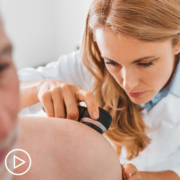What Should Non-Melanoma Skin Cancer Patients Consider About Treatment?
What Should Non-Melanoma Skin Cancer Patients Consider About Treatment? from Patient Empowerment Network on Vimeo.
What is vital for non-melanoma skin cancer patients to know about treatment decisions? Expert Dr. Silvina Pugliese from Stanford Cancer Center explains how she works with patients and shares advice for communicating with your doctor.
Silvina Pugliese, M.D., is a Clinical Assistant Professor of Dermatology and Attending Physician at the Stanford Medicine Outpatient Center and Stanford Cancer Institute. Learn more about Dr. Pugliese.
[ACT]IVATION TIP
“…making sure that you have received all the information that you want, that you’ve received the opinions that you think are important for making that decision, and that you feel comfortable like you were able to make an informed decision.”
Download Guide | Download Guide en español
See More from [ACT]IVATED Non-Melanoma Skin Cancer
Related Resources:

Non-Melanoma Skin Cancers and Clinical Trials | Advancing Science for Everyone |

|

Melanoma vs. Non-Melanoma Skin Cancer | What’s the Difference? |
Transcript:
Mary Leer:
Dr. Pugliese, I’m curious, how do you work with your patients to make treatment decisions? And my curiosity in part is coming from, I have several family members that have had non-melanoma skin cancer, so I’m curious how you work with your patients and with the increase in treatment options, what should non-melanoma skin cancer patients consider when they’re deciding on a treatment?
Dr. Silvina Pugliese:
Those are great questions. So one of the first things that I do when working with patients to make any kind of treatment decision is, of course, first establish just a very open and trusting relationship where patients feel comfortable talking to me about what their concerns are with their skin cancer diagnosis and what their treatment preferences are because we could have all the information in the world, but it’s really not ideal to make a decision if we don’t know what a patient wants to do and what their fears are and what their questions are. So just having a really open and trusting relationship I think is an important foundation that we need before we can really counsel anyone on treatment decisions. And then the next component is really that knowledge piece. So presenting all the options that are available to me that I know of.
And, of course, always connecting patients when needed to other resources. I work very closely with other oncologists, with oncologists, I’m sorry, with other dermatologists, with oncologists, with radiation oncologists, with medical oncologists, with surgical oncologists because often the treatment for patients that have more advanced squamous cell cancer is going to be a multidisciplinary treatment, involving many different specialties.
So for that reason, it’s very important to make sure that I’m not only discussing the things that I can do in dermatology, but that I’m connecting patients to all of the available resources. I do provide my opinion when patients ask, but again it’s really about what patients want to do. And I do think that it’s a very personal decision. We think about treatment options for treating non-melanoma skin cancers.
So listening, establishing a good relationship, providing all of the available treatment options, and then just having a conversation and being available when questions arise. I find that some patients want the lowest risk of recurrence always, and other patients are more focused on side effects. So that is going to impact how we frame, we discuss the treatment options available.
The good news, I will say for most squamous cell cancer and basal cell cancer is that, again, the treatment options are going to be lower risk, so for most basal cell and squamous cell, we will discuss depending on the subtype, either using topical creams or doing surgical excision or doing Mohs surgery depending on the location, and then based on that, I would ask patients what their greatest concerns are, what their goals are, and what their clinical follow-up can be so that we make the best decision for patients.
So my activation tip for patients in terms of this question is to make sure that before making any kind of treatment decision, you feel comfortable asking questions, that you feel like all your answers have been addressed. You should never make a decision where you think you’re making it based on incomplete information, and, of course, we can never know the outcome, and we can’t know everything about everything.
But I think it is really important that you feel the most comfortable possible when you make a treatment decision, it is very impactful. So again, just making sure that you have received all the information that you want, that you’ve received the opinions that you think are important for making that decision, and that you feel comfortable like you were able to make an informed decision.
Share Your Feedback:
Create your own user feedback survey



